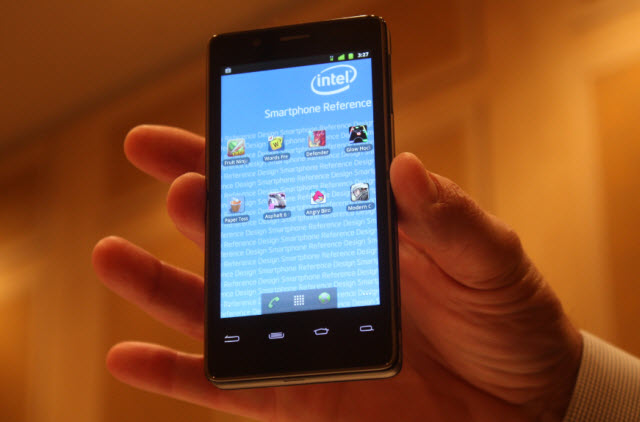Intel chief executive Paul Otellini confidently asserted today that the world’s biggest chip maker is pulling ahead of its rivals in chip manufacturing technology.
[aditude-amp id="flyingcarpet" targeting='{"env":"staging","page_type":"article","post_id":417872,"post_type":"story","post_chan":"none","tags":null,"ai":false,"category":"none","all_categories":"business,","session":"C"}']Speaking to analysts in a quarterly conference call, Otellini said Intel has begun manufacturing its 22-nanometer, 3D tri-gate transistors with its newest chips. The vertically-oriented tri-gate transistors can deliver twice the performance for the same level of power, making it possible for Intel to launch more powerful chips for smartphones and laptops. Otellini said that the first smartphone based on Intel’s latest chips will be launching this week.
Intel is one of the few companies in the industry that creates its own manufacturing process, factories, and design. That is an “increasingly rare” business model in the chip industry, Otellini said. He said Intel will produce new generations of chips twice as fast as the normal rate of Moore’s Law (which calls for a doubling of transistors every two years) by 2014.
AI Weekly
The must-read newsletter for AI and Big Data industry written by Khari Johnson, Kyle Wiggers, and Seth Colaner.
Included with VentureBeat Insider and VentureBeat VIP memberships.
“We are doing this at a time when the rest of the industry is struggling to implement older technology,” Otellini said. “Advances like this are getting harder and harder to achieve,” he said, but the big changes are just the beginning.
Intel has begun its largest ad campaign in a decade in the past month, he said. It is promoting Ultrabooks, or MacBook Air-style laptops with high-performance, good energy efficiency, and thin profiles. He said he is excited about Ultrabooks because they are convenient and thin like tablets but more productive and useful because they have keyboards.
Intel has begun production of its Ivy Bridge hybrid microprocessors, which combine a processor and graphics on a single chip. Intel said it has been able to ramp up its Ivy Bridge chip manufacturing in three factory sites rather than the normal two. He said Ivy Bridge will be Intel’s fastest-ramping chip ever and that the company’s chips will be used across a range of price points and in the server market as well.
Otellini also said that Intel will launch Centerton, an Atom-based server chip used in small, energy-efficient computers known as micro servers.
Nathan Brookwood, an analyst at Insight 64, said, “Intel is way ahead of the industry in its shift to 22nm, with or without tri-gate. (Rivals) TSMC and GlobalFoundries are still in the early stages of their 28/32nm ramps, while Intel is now shipping 22nm Ivy Bridge chips and says it will be a quarter of their volume in Q2.”
“The other guys argue that they can do one more generation (i.e. 20/22nm) using traditional planar FET transistors, and don’t plan on going to fin-FET technology until their 14nm generations. But you won’t see 20nm chips ramping from TSMC, UMC, or GloFo for at least three years,” Brookwood said.
[aditude-amp id="medium1" targeting='{"env":"staging","page_type":"article","post_id":417872,"post_type":"story","post_chan":"none","tags":null,"ai":false,"category":"none","all_categories":"business,","session":"C"}']
[Photo credit: Intel-based smartphone, by Dean Takahashi]
VentureBeat's mission is to be a digital town square for technical decision-makers to gain knowledge about transformative enterprise technology and transact. Learn More

